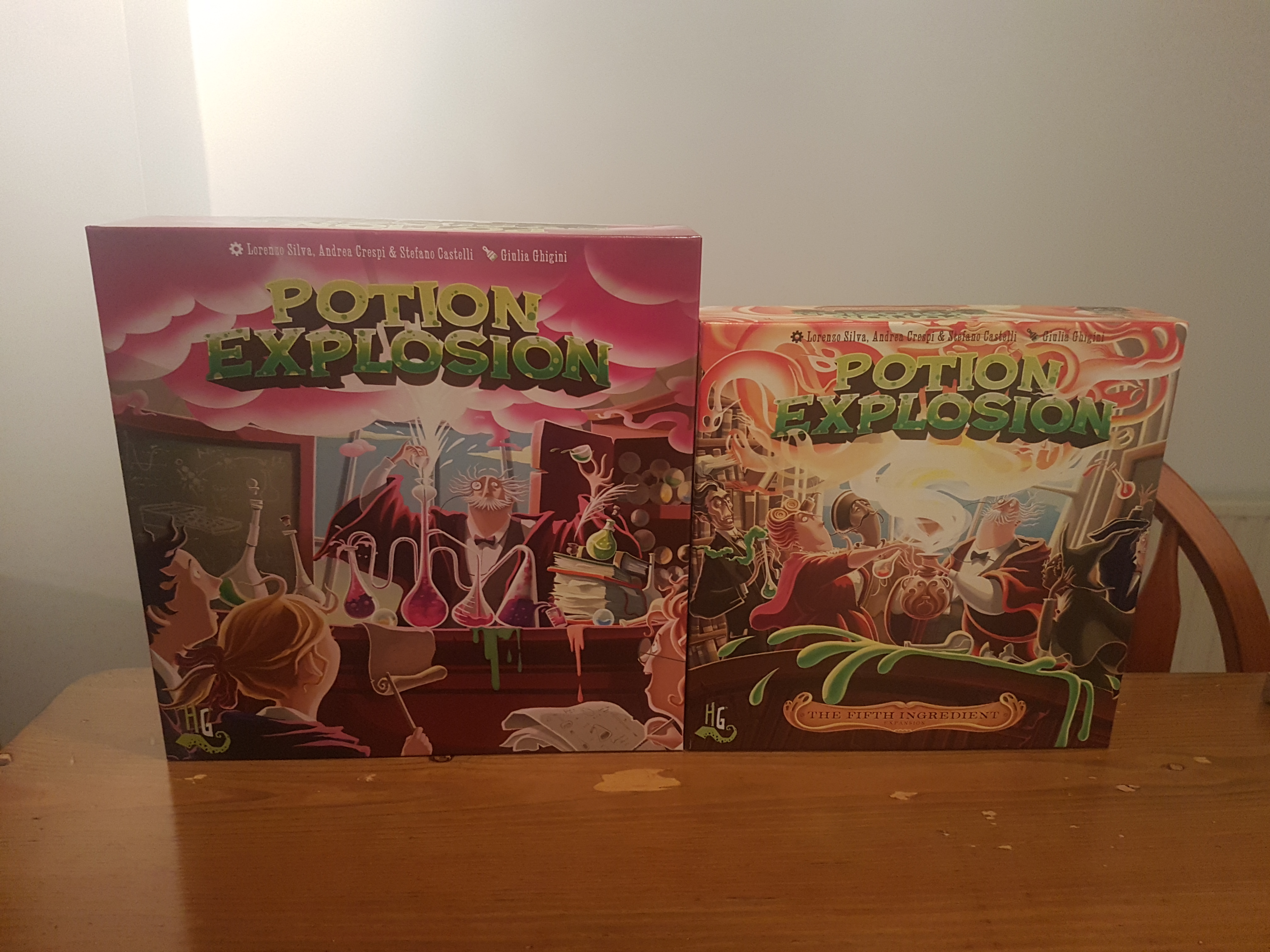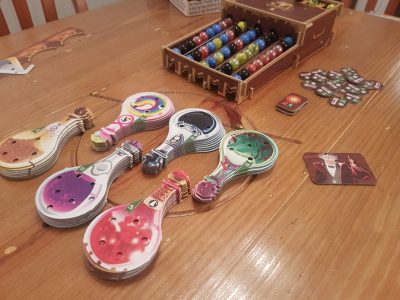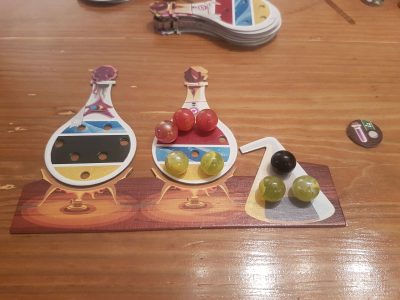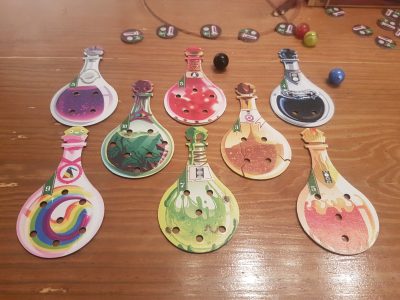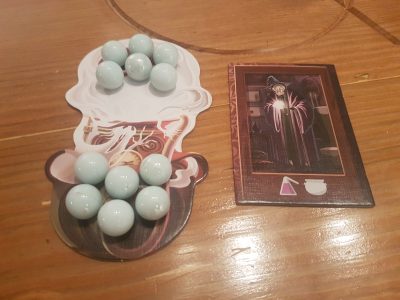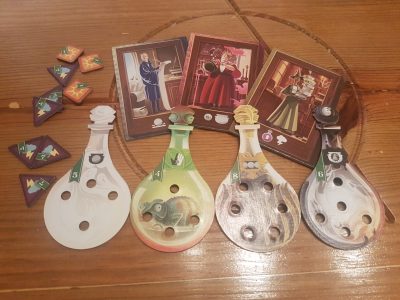Potion Explosion is a pattern recognition, set collection marble base board game from Horrible Games. The game was designed by Lorenzo Silva, Andrea Crespi and Stefano Castelli, and sees 2 – 4 players taking a Potion based exam. Lasting around 30 – 60 minutes is this the sort of exam you want to take part in or does it all boil over, due to a mixture of ingredients? Let’s find out!
After unboxing, punching out the potions and pieces, the ingredient dispenser must be constructed. This is a onetime affair and then the game is pretty much ready to go. To start the game off the ingredient marbles are tipped randomly into the dispenser. Two of the eight potion types are removed from play to limit those available; with a number of starter potions, equal to twice the number of players, set aside. The rest of the potions are shuffled and split into five even piles at the centre of the table.
In turn order players choose a potion from the starting tiles and places them into their personal desks. From here, each a turn players get to take a single marble from the dispenser. When doing this explosions can occur: if removing the marble causes two or more of the same colour to touch. These exploding ingredients are also claimed by the player and can go on to cause further explosions. Once this process is over the player may place, from their hand, any coloured marbles onto their potion tiles into the appropriately coloured sections. Three left over ingredients can be saved in a flask for later the rest are discarded back into the dispenser.
Each potion requires a different amount of differing coloured marbles to complete it. For instance, a starter Potion of Magnetic Attraction may need two black and two blue ingredient marbles. Each turn a player can complete a maximum of two potions. If at the start of a turn a player has less than two on their personal desk board they can draw potions from the top of any of the five central piles. Aside from the ingredients required for brewing, potions come with two important attributes: victory points and an ability.
8 unique potion types are included in the base game, each wonderfully named and coming with their own ability. These range from the potent sounding Elixir of Blind Love, which enables the player to steal the marbles left in another players flask, to the Potion of Wisdom, which allows the drinker to take a single marble from the dispenser. Not every potion sees the player use marbles though. The Potion of Prismatic Joy is extremely helpful for completing additional potions. It enables the player to use marbles of any colour to fill in gaps in their potions. Each helps in one way or another, though individual players will certainly gravitate towards claiming the same types game after game.
As the number of ingredient marbles increases the return in victory points also raises. This encourages players to go for harder to complete potions, rather than just consistently grabbing easy ones. Depending on the player count a number of 4-point bonus tokens are available from the start of the game. Collecting a minimum of 3 of one type or 1 of 5 types will bag you one of these bonus tokens. Once all the tokens are taken the game end is triggered, with all other players up to the starting player getting one last turn. Points are then calculated and the best potion maker is announced.
Little Help tokens are a brilliant inclusion, changing from a “noob” friendly help to a strategic choice as experience grows. For those new to the game they allow a player to claim a quick marble to finish a potion while getting the gist of the game and completing early potions. After a game or two and when to use the help, taking the minus 2-point penalty, becomes either a time conscious decision or a way of completing a helpful potion. If the game is getting close to the end taking a 2-point loss to complete a point scoring potion is 100% worth it. At the same time, doing so early on to unlock a potion ability that could help gain further points has the potential to win you the game. It is all a trade-off and one that works extremely well no matter how many games you’ve played.
Hats off to the team for designing a game that fits so well into the box after the main dispenser has been constructed. It might sound like an unusual element to praise but this is something which a lot of games that included components on cardboard punch-out sheets fail to account for. On one hand, the marble dispenser is extremely easy to put together. On the other, I’m glad that building it is a one-time thing, making the setup time of future games unbelievably quick.
The crux of the game is all about getting the right combinations of the coloured marbles, making explaining the game incredibly simple. Having two potions on the go at once keeps players options open so there isn’t often a hard decision to be made, keeping the game flowing. Potion Explosion thrives at being a fast-paced game so anything that detracted from this speed, such as analysis paralysis, would slowly kill the enjoyment.
While the game is designed for 2 – 4 players I would lean towards the lower end of this range. With two players you can look ahead, hoping the other player chooses a different marble run to draw from. There is also slightly more speed to 2 or 3 player games, as the downtime between turns is lessened compared to a 4-player game. On top of this as the player count grows the amount of marbles left in the dispenser reduces. This results in less optimal marble options that can push players into taking their time on turns, unfortunately slowing the game down. There is one saving grace to increasing the player count, the potion power to steal from an opponent’s flask becomes much more useful when having a choice of whom to target.
Bright and vibrant colours have been used for the ingredient marbles and the potion boards making the whole game very eye-catching. This in combination with the ingredient dispenser result in Potion Explosion having incredible table presence. It was entertaining merely witnessing people outside of the game being drawn in by what they could see. It all boils down to there being something extremely satisfying about the clinking of marbles that sends people back to their childhood.
Potion Explosion is designed in such a way that the majority of the game shouts out at being a gateway game, drawing people into the hobby. The game is reminiscent of games such as Candy Crush or the older bubble burst style games meaning it’s rather accessible for new players. Keeping things simple, the general action of drawing marbles is instantly understood, with the Little Help token being picked up during a first game. For avid gamers the potion powers are easy to use, with iconography and unique colourful designs used for each type. For those new to the hobby learning six powers occasionally resulted in a few questions but nothing major to worry about.
Overall, Potion Explosion provides a unique, and more importantly fun, experience. It mixes the puzzle of which is the optimal marble to take with the fun of set collection based potions. The theming works well to make sense of the mechanics, and for why players are claiming marbles and mixing colours together for points. The game fits into the sweet spot that many a gateway games do; it catches players attention with something striking at the centre of the table yet there is a familiarity that enables players to jump in and play. The uniqueness of Potion Explosion alone claims the games place on my gaming shelf and then the entertainment provided cements it!
5th Ingredient Expansion
So what does The Fifth Ingredient bring to the potion brewing bench? Players can now get scolded or rewarded, special professors look over the potion crafting, four new potion types are added to the menu and a new wild ingredient is thrown into the cauldron. Each element can technically be added in separately but they balance out to keep the weight of the game about the same, so why not enjoy the full experience!
The main addition is this new ingredient, the lovely sounding Ghost Ectoplasm, represented by white marbles. Ghost Ectoplasm acts as a bit of a wild marble resulting in making potions that bit easier. These can therefore be used separately to make the base game that bit easier if players are consistently struggling to make combinations. By default none start in the dispenser, though there’s nothing stopping you pour a few in. Normally these wild marbles start in the Ghastly Cauldron, with the special professor powers or certain new potions allowing players to exchange normal ingredients for them.
Professor tiles are the next wave of new in this expansion and make the game a bit more interesting. Each professor tweaks the rules slightly making each game feel that bit different. The likes of Professor Albedus Humblescore, whom allows players to discard two marbles of the same colour to discard a Little Help token, are small tweaks that can see players exploiting the base game mechanics differently. While the likes of Gideon Prissymann add a completely new mechanic in the form of Scolding. If you let a marble touch the table on your turn you get a negative Scolding token, so no dropping ingredients!
Then comes ways to get Ectoplasm out of the cauldron, which scores players a reward token. For example, Professor Overwhilma Explosiwa enables players who manage to get 8 or more ingredients from the dispenser on a turn to exchange one with the Ghastly Cauldron. There are 7 professors in total and each add to the replayability of the game. On top of this if one isn’t enough you can always make the game a bit crazy and have two in-play.
Four new potions are added into the game via The Fifth Ingredient expansion. Two of these are very reminiscent of some of the potions in the base game, with slight tweaks. The other two, the Ghastly Concoction and the Dram of Poltergeist Sweat, focus on getting the wild marbles into play. As a game only uses 6 potion types adding these four to the mix allows for exponentially more variations, again leading to more variation from game to game.
The Fifth Ingredient is a small expansion for Potion Explosion that I’m sure fans of the base game will thoroughly enjoy. The wild marbles do make crafting potions a bit easier, though they also add some strategies from obtaining the wild marbles into the mix. At the other end of the difficulty spectrum, there are new elements players can add into the game to spice things up, giving players a little more to think about. Overall, for the heightened entertainment I wouldn’t go back to playing just the base game, unless introducing the game to new players. While elements are shaken up the core mechanics haven’t been altered, leading to an expansion which isn’t a required but can help keep the entertainment boiling over for more plays!
[Editor’s Note: Potion Explosion and The Fifth Ingredient was provided to us by Horrible Games for the review.]

